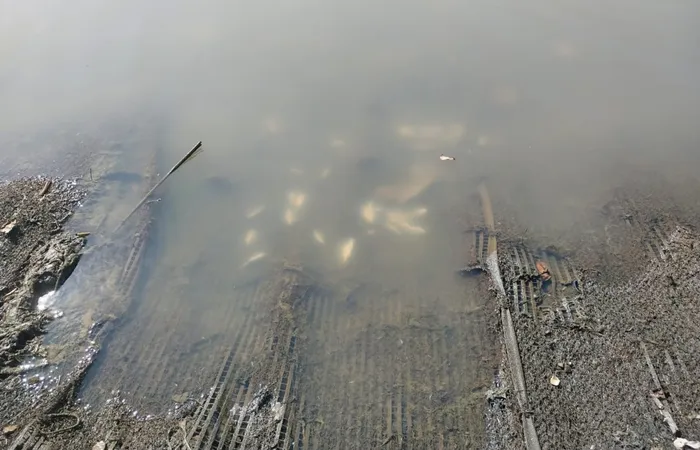Conservation groups call for urgent action as eThekwini Municipality closes some Durban beaches after high E. coli levels detected

Scores of dead fish were found along the banks of the uMngeni River at Blue Lagoon yesterday. The municipality said the incident would be investigated. Dead fish along the banks of the uMngeni River near Blue Lagoon. Picture: Yogashen Pillay
Durban - EThekwini Municipality has taken the decision to close some of Durban’s beaches with immediate effect due to high levels of E coli in the water.
This comes after scores of dead fish washed up on the banks of the uMngeni River near Blue Lagoon yesterday. The incident follows The Mercury’s reports that scores of dead fish washed up at Isipingo Beach lagoon two weeks ago.
The South Durban Community Environmental Alliance (SDCEA) and the KZN Subsistence Fishing Forum said they believed that the fish had washed up after a sewage leak into the uMngeni River.

Conservation group Adopt a River said it had raised the matter with the authorities.
Desmond D’Sa, co-ordinator of the SDCEA, said a community member had called the organisation’s offices to alert them to a large number of dead fish at Blue Lagoon, along the uMngeni River.
“This comes after the Isipingo fish kill incident, which just took place at the beginning of this month and has yet to be resolved. Although the exact cause of the dead fish could not be ascertained, it was clear that yet again the municipality and government have failed citizens and the environment. I have to question the municipalities’ negligence and lack of maintenance of core infrastructure, as well as their lack of concern for those who rely on the ocean and river systems for their livelihoods.”
John Peter Narainsamy, the chairperson of the KZN Subsistence Fishing Forum, said he believed the dead fish washing up at the uMngeni River were linked to a sewage leak.
“Just two weeks back, we had a similar incident, it was devastating to see the amount of fish that washed up on the Isipingo Lagoon beach. We believe that one of the pumps failed and caused sewage to spill in the Isipingo Lagoon, resulting in the large amount of dead fish. We believe that the cause of dead fish here may be the result of another pump failure and sewage leaking into the uMngeni river.”
Narainsamy said it was concerning that when they arrived, there were no officials present.
“There were no officials to tell fishermen that they shouldn’t be fishing, and we had to tell them that there were dead fish that posed a health risk. Remember these guys are subsistence fishers and this is what they do for a living, and it’s sad that they won’t have any food or income.”
Janet Simpkins, the founder and director of Adopt a River, said tests conducted with Talbot laboratories last week on the water in the uMngeni River showed that the E coli levels were critically high.
“We have taken this matter to the relevant authorities, but no intervention was taken.
“It’s sad that we had to wait for dead fish to wash up for us to take notice of the high E coli levels.”
Simpkins said urgent intervention was needed.
“We need intervention from the Department of Water and Sanitation as this is not a local issue, it is a national issue and an emergency. Only the national Department of Water and Sanitation has the funds to intervene and conduct the necessary repairs.”
Heinz de Boer, the DA KZN’s spokesperson on economic development, tourism and environmental Affairs, said reports of hundreds of fish dying in the Blue Lagoon area came in the wake of widespread claims of sub-standard drinking water in some parts of Durban.
“The economic, health and tourism consequences of this governmental blunder are set to decimate our province's tourism sector.”
Municipal spokesperson Msawakhe Mayisela said the city had taken the decision to close some beaches with immediate effect due to high levels of E coli in the water.
“This decision is a consequence of recent water testing results that confirmed high levels of E coli. All water activities such as swimming, surfing, fishing, bathing, canoeing, and other activities taking place at certain city beaches are therefore prohibited. Beachgoers are urged to heed this warning as disregarding it could result in outbreaks of waterborne diseases.”
Mayisela said residents can still enjoy other activities along the beach that do not require them to come into contact with sea water. “Closed beaches include Westbrook, uMhlanga Main, uMdloti, Casuarina, eThekwini Beach, Laguna Seasonal Beach, Ansteys Beach, Brighton Beach, Isipingo Beach, Reunion Beach, Warner Beach, Amanzimtoti Main Beach, and Pipeline Beach.
“Lifeguards and law-enforcement officers will be on site to monitor the beaches to ensure the public adheres to the closures. The public will be notified when the beaches are deemed safe to use.”
Regarding the dead fish near Blue Lagoon, the city said it would investigate the incident and warned the public not to collect or consume the fish.
The city said it would remove the fish.
Fishing forum, environmental activist raise alarm over scores of dead fish at Isipingo beach lagoon
VIDEOS: City launches investigation into hundreds of dead fish at Isipingo beach lagoon while clean up operation is under way
DA calls for water quality testing as reports of contaminated water surface
Alarming levels of E coli in Durban rivers says environmental organisation
Related Topics: